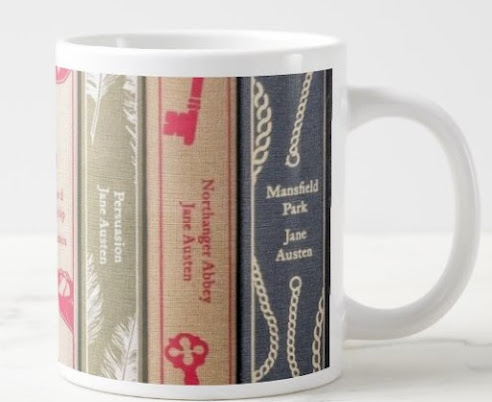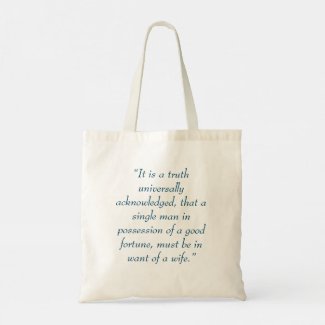 |
| This blanket is one of the hundreds of themed products available at Totally_Jane_Austen |
" '..she only demands from each of you either one thing very clever, be it prose or verse, original or repeated--or two things moderately clever--or three things very dull indeed, and she engages to laugh heartily at them all."
 |
| wine charms exclusive to Totally_Jane_Austen |
"Oh! very well," exclaimed Miss Bates, "then I need not be uneasy. 'Three things very dull indeed.' That will just do for me, you know. I shall be sure to say three dull things as soon as ever I open my mouth, shan't I? (looking round with the most good-humoured dependence on every body's assent)--Do not you all think I shall?"
Emma could not resist.
 |
| Locket by Totally_Jane_Austen |
Miss Bates, deceived by the mock ceremony of her manner, did not immediately catch her meaning; but, when it burst on her, it could not anger, though a slight blush shewed that it could pain her.
"Ah!--well--to be sure. Yes, I see what she means, (turning to Mr. Knightley,) and I will try to hold my tongue. I must make myself very disagreeable, or she would not have said such a thing to an old friend."
There is some additional dialog and a bit of narrative until Mr. Knightley is able to confront Emma alone and take her to task:
While waiting for the carriage, she found Mr. Knightley by her side. He looked around, as if to see that no one were near, and then said,
"Emma, I must once more speak to you as I have been used to do: a privilege rather endured than allowed, perhaps, but I must still use it. I cannot see you acting wrong, without a remonstrance. How could you be so unfeeling to Miss Bates? How could you be so insolent in your wit to a woman of her character, age, and situation?--Emma, I had not thought it possible."
Emma recollected, blushed, was sorry, but tried to laugh it off.
"Nay, how could I help saying what I did?--Nobody could have helped it. It was not so very bad. I dare say she did not understand me."
"I assure you she did. She felt your full meaning. She has talked of it since. I wish you could have heard how she talked of it--with what candour and generosity. I wish you could have heard her honouring your forbearance, in being able to pay her such attentions, as she was for ever receiving from yourself and your father, when her society must be so irksome."
"Oh!" cried Emma, "I know there is not a better creature in the world: but you must allow, that what is good and what is ridiculous are most unfortunately blended in her."
"They are blended," said he, "I acknowledge; and, were she prosperous, I could allow much for the occasional prevalence of the ridiculous over the good. Were she a woman of fortune, I would leave every harmless absurdity to take its chance, I would not quarrel with you for any liberties of manner. Were she your equal in situation--but, Emma, consider how far this is from being the case. She is poor; she has sunk from the comforts she was born to; and, if she live to old age, must probably sink more. Her situation should secure your compassion. It was badly done, indeed! You, whom she had known from an infant, whom she had seen grow up from a period when her notice was an honour, to have you now, in thoughtless spirits, and the pride of the moment, laugh at her, humble her--and before her niece, too--and before others, many of whom (certainly some,) would be entirely guided by your treatment of her.--This is not pleasant to you, Emma--and it is very far from pleasant to me; but I must, I will,--I will tell you truths while I can; satisfied with proving myself your friend by very faithful counsel, and trusting that you will some time or other do me greater justice than you can do now."
You can judge for yourself which adaption of the picnic at Box Hill, showed this lesson best, thanks to the compilation here:
With great status comes great responsibility
Related:
Totally_Jane_Austen




